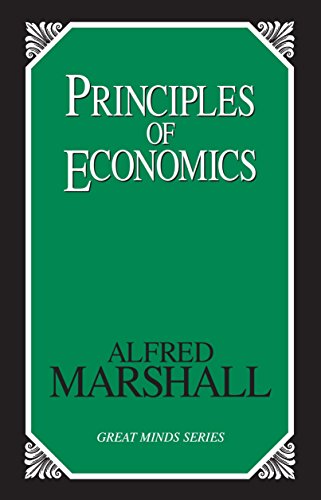
Synopsis
British economist Alfred Marshall (1842-1924) was one of the founders of the "neoclassical" school in which economists studied both wealth and human behavior to understand why we make the choices we do. First published in 1890, Principles of Economics stands as Marshall's most influential work. This abridged edition offers a general introduction to the study of economics, dealing mainly with normal conditions of industry, employment, and wages. It begins by isolating the primary relations of supply, demand, and price in regard to a particular commodity. Following his study of science, history, and philosophy, Marshall argues that, while fragmentary statistical hypotheses are used as temporary aids to dynamic economic concepts, the central idea of economics must be that of a living force and movement, and its main concern must be with human beings who are impelled, for better or worse, to change and progress.
"synopsis" may belong to another edition of this title.
About the Author
ALFRED MARSHALL, distinguished British economist, was born in London on July 26, 1842. His interest in economics arose out of his earlier studies of philosophy and mathematics. Following his tenure as first principal of University College, Bristol (1877-1881), Marshall taught at Cambridge University from 1885 to 1908, and lived in Cambridge for the remainder of his life.
Marshall's chief work is the Principles of Economics (1890; eighth edition 1920). One of the founders of the so-called neo-classical school, Marshall argued that the economy would run best if left on its own, and that the normal functioning of a market econ-omy leads to full employment. Though influenced by the ideas of John Stuart Mill, Marshall substantially altered Mill's frame of ref-erence: instead of analyzing how the production of goods and the distribution of income among different social classes affected, often dramatically, economic well-being, he studied price setting in a static context, focusing on small, gradual changes and the complex interrelations by which market balance, or "equilibrium," is achieved. And while the earlier political economists Adam Smith and David Ricardo had identified labor as the force deter-mining the exchange value of goods, Marshall identified it as sat-isfaction of consumers' desires, or utility. Marshall's orderly Victorian picture of supply, demand, and price, particularly at a time when contemporary socialists and trade unions were challenging the status quo, came under attack by later economists, including John Maynard Keynes, who demon-strated that market forces can be ineffective in promoting full employment and who advocated enlightened government inter-vention over laissez-faire policies. Nonetheless, Marshall's work continues to influence orthodox economics. Alfred Marshall died in Cambridge on July 13, 1924. Marshall's other published works include Industry and Trade (1919) and Money, Credit, and Commerce (1923)."About this title" may belong to another edition of this title.
Search results for Principles of Economics (Great Minds Series)
Principles of Economics (Great Minds)
Seller: Half Price Books Inc., Dallas, TX, U.S.A.
Paperback. Condition: Very Good. Connecting readers with great books since 1972! Used books may not include companion materials, and may have some shelf wear or limited writing. We ship orders daily and Customer Service is our top priority! Seller Inventory # S_440352935
Principles of Economics (Great Minds)
Seller: -OnTimeBooks-, Phoenix, AZ, U.S.A.
Condition: good. A copy that has been read, remains in good condition. All pages are intact, and the cover is intact. The spine and cover show signs of wear. Pages can include notes and highlighting and show signs of wear, and the copy can include "From the library of" labels or previous owner inscriptions. 100% GUARANTEE! Shipped with delivery confirmation, if you're not satisfied with purchase please return item for full refund. Ships via media mail. Seller Inventory # OTV.1573921408.G
Principles of Economics
Seller: ThriftBooks-Dallas, Dallas, TX, U.S.A.
Paperback. Condition: Fair. No Jacket. Readable copy. Pages may have considerable notes/highlighting. ~ ThriftBooks: Read More, Spend Less. Seller Inventory # G1573921408I5N00
Principles of Economics (Great Minds)
Seller: World of Books (was SecondSale), Montgomery, IL, U.S.A.
Condition: Good. Item in good condition. Textbooks may not include supplemental items i.e. CDs, access codes etc. Seller Inventory # 00083475144
Principles of Economics
Seller: Better World Books, Mishawaka, IN, U.S.A.
Condition: Very Good. Former library book; may include library markings. Used book that is in excellent condition. May show signs of wear or have minor defects. Seller Inventory # 7899712-6
Principles of Economics
Seller: Better World Books: West, Reno, NV, U.S.A.
Condition: Very Good. Former library book; may include library markings. Used book that is in excellent condition. May show signs of wear or have minor defects. Seller Inventory # 7899712-6
Principles of Economics
Seller: Better World Books: West, Reno, NV, U.S.A.
Condition: Good. Used book that is in clean, average condition without any missing pages. Seller Inventory # 5425975-6
Principles of Economics (Great Minds)
Seller: HPB Inc., Dallas, TX, U.S.A.
Paperback. Condition: Very Good. Connecting readers with great books since 1972! Used books may not include companion materials, and may have some shelf wear or limited writing. We ship orders daily and Customer Service is our top priority! Seller Inventory # S_442920591
Principles of Economics (Great Minds)
Seller: Book Alley, Pasadena, CA, U.S.A.
paperback. Condition: Very Good. Very Good. Used with some reading wear but is still in great reading condition. No markings in text. Seller Inventory # mon0000752791
Principles of Economics (Great Minds Series)
Seller: WorldofBooks, Goring-By-Sea, WS, United Kingdom
Paperback. Condition: Very Good. The book has been read, but is in excellent condition. Pages are intact and not marred by notes or highlighting. The spine remains undamaged. Seller Inventory # GOR002920928
